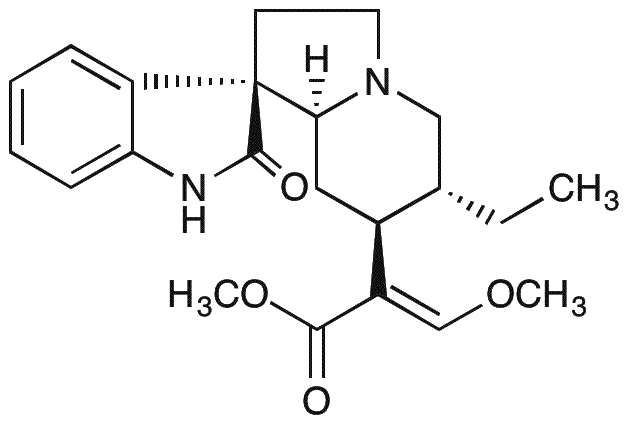Rhynchophylline is widely utilized in research focused on:
- Neuroprotection: This compound has shown potential in protecting neurons from damage, making it valuable in studies related to neurodegenerative diseases such as Alzheimer's and Parkinson's.
- Anti-inflammatory Applications: Rhynchophylline exhibits anti-inflammatory properties, which can be beneficial in developing treatments for chronic inflammatory conditions, particularly in the fields of rheumatology and immunology.
- Cardiovascular Health: Research indicates that this compound may help improve cardiovascular function, making it relevant for studies aimed at heart disease prevention and treatment.
- Traditional Medicine: Traditionally used in herbal medicine, rhynchophylline is gaining attention for its potential therapeutic effects, particularly in Asian medicine, where it is utilized for various ailments.
- Research on Addiction: Emerging studies suggest that rhynchophylline may play a role in reducing addiction behaviors, particularly in relation to nicotine and other substances, thus offering a new avenue for addiction treatment research.
Información general
Propiedades
Seguridad y normativas
Aplicaciones
Rhynchophylline is widely utilized in research focused on:
- Neuroprotection: This compound has shown potential in protecting neurons from damage, making it valuable in studies related to neurodegenerative diseases such as Alzheimer's and Parkinson's.
- Anti-inflammatory Applications: Rhynchophylline exhibits anti-inflammatory properties, which can be beneficial in developing treatments for chronic inflammatory conditions, particularly in the fields of rheumatology and immunology.
- Cardiovascular Health: Research indicates that this compound may help improve cardiovascular function, making it relevant for studies aimed at heart disease prevention and treatment.
- Traditional Medicine: Traditionally used in herbal medicine, rhynchophylline is gaining attention for its potential therapeutic effects, particularly in Asian medicine, where it is utilized for various ailments.
- Research on Addiction: Emerging studies suggest that rhynchophylline may play a role in reducing addiction behaviors, particularly in relation to nicotine and other substances, thus offering a new avenue for addiction treatment research.
Documentos
Hojas de datos de seguridad (HDS)
La SDS proporciona información de seguridad completa sobre la manipulación, el almacenamiento y la eliminación del producto.
Especificación del producto (PS)
La PS proporciona un desglose completo de las propiedades del producto, incluida la composición química, el estado físico, la pureza y los requisitos de almacenamiento. También detalla los rangos de calidad aceptables y las aplicaciones previstas del producto.
Certificados de análisis (COA)
Busque certificados de análisis (COA) ingresando el número de lote del producto. Los números de lote y de partida se pueden encontrar en la etiqueta de un producto después de las palabras "Lote" o "Lote".
Número de catálogo
Número de lote/lote
Certificados de origen (COO)
Este certificado de origen confirma el país en el que se fabricó el producto y también detalla los materiales y componentes utilizados en él y si se deriva de fuentes naturales, sintéticas u otras fuentes específicas. Este certificado puede ser necesario para cumplir con las normativas aduaneras, comerciales y regulatorias.
Número de catálogo
Número de lote/lote
Hojas de datos de seguridad (HDS)
La SDS proporciona información de seguridad completa sobre la manipulación, el almacenamiento y la eliminación del producto.
DownloadEspecificación del producto (PS)
La PS proporciona un desglose completo de las propiedades del producto, incluida la composición química, el estado físico, la pureza y los requisitos de almacenamiento. También detalla los rangos de calidad aceptables y las aplicaciones previstas del producto.
DownloadCertificados de análisis (COA)
Busque certificados de análisis (COA) ingresando el número de lote del producto. Los números de lote y de partida se pueden encontrar en la etiqueta de un producto después de las palabras "Lote" o "Lote".
Número de catálogo
Número de lote/lote
Certificados de origen (COO)
Este certificado de origen confirma el país en el que se fabricó el producto y también detalla los materiales y componentes utilizados en él y si se deriva de fuentes naturales, sintéticas u otras fuentes específicas. Este certificado puede ser necesario para cumplir con las normativas aduaneras, comerciales y regulatorias.


